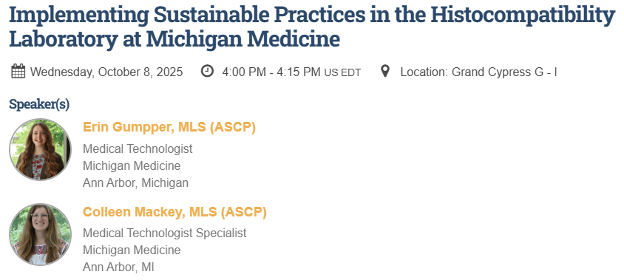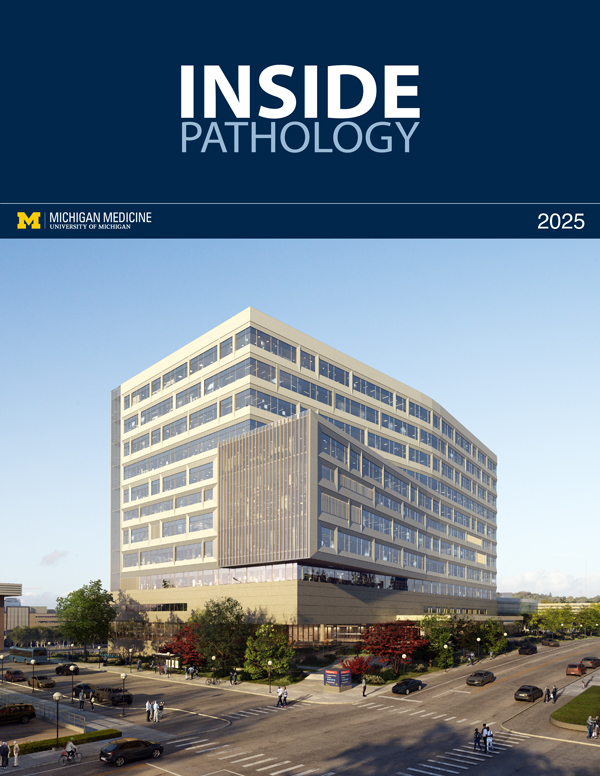Implementing Sustainable Practices in the HLA Lab
By Anastazia Hartman | September 30 2025This October, Erin Gumpper, MLS (ASCP), and Colleen Mackey, MLS (ASCP) of the Histocompatibility Laboratory will present at the ASHI Conference in Orlando, Florida, on the topic of sustainability in the HLA Lab.
"The abstract elaborating on the Implementation of Sustainability Practices here at the NCRC HLA Lab was so well received by ASHI that the request came back for both Erin and Colleen to present in person in Orlando, Florida, next month. The directors and team are so very proud of these two outstanding team members," said Lisa McMurry, Hematopathology and Histocompatibility Manager.
Implementing Sustainable Practices in the Histocompatibility Laboratory at Michigan Medicine
Aim: Healthcare contributes to 4.6% of global carbon emissions, with laboratories producing more than 5 million tons of plastic waste per year. Aligned with the University of Michigan’s Vision 2034 sustainability plan, Michigan Medicine (MM) is committed to carbon neutrality with goals to reduce greenhouse gas emissions and minimize waste generation. The MM Histocompatibility (HLA) laboratory took initiative, working together to implement sustainable practices through optimizing freezer usage, integrating recycling programs, and digitizing workflows to reduce paper usage.
Methods: To improve energy efficiency, our HLA lab participated in the My Green Lab: International Laboratory Freezer Challenge. Maintenance was performed on 11 ultra-low (≤ -70°C) and 9 -20°C freezers, including full defrosts and cleaning of filters, coils, and intakes. Sample storage was converted to a high-density format, allowing us to empty 1 ultra-low and 2 -20°C freezers. To reduce plastic waste, we have joined the Thermo Fisher TipCycle program to recycle pipette tip racks and boxes. To further reduce waste, we identified our highest paper-consuming processes: newly listed patient documentation, post-transplant checklists, daily run worksheets, and add-on forms. Collaborating with the hospital informatics team and utilizing tools in Excel and Microsoft Teams, these workflows were digitized, resulting in a significant decrease in paper usage.
Results: Participation in the freezer challenge achieved an estimated energy savings of 80 kWh per day. Over a year, these savings are equivalent to the energy consumption of 3 average US homes. This accomplishment received international recognition, earning the top award for a medium-sized laboratory in the Academic Sector for 2024. Since joining the TipCycle program, we have recycled 514 pounds of plastic from May 2024 to April 2025. By transitioning to digital workflows, we saved approximately 9,497 pages over the past year, equating to the preservation of about one standard 45-foot pine tree.
Conclusion: Clinical and research laboratories are essential in the global effort to reduce greenhouse gas emissions and waste. We hope the sustainable practices implemented by the HLA lab at MM will inspire other laboratories to evaluate and improve their own operations. Together, these efforts can contribute to building a greener, more sustainable, and healthier community.

 ON THE COVER
ON THE COVER
 ON THE COVER
ON THE COVER
 ON THE COVER
ON THE COVER
 ON THE COVER
ON THE COVER
 ON THE COVER
ON THE COVER
 ON THE COVER
ON THE COVER
 ON THE COVER
ON THE COVER
 ON THE COVER
ON THE COVER
 ON THE COVER
ON THE COVER
 ON THE COVER
ON THE COVER
 ON THE COVER
ON THE COVER
